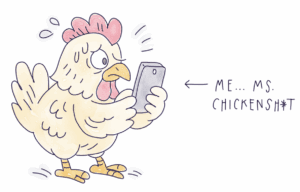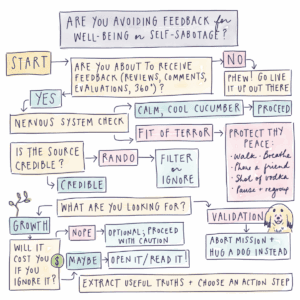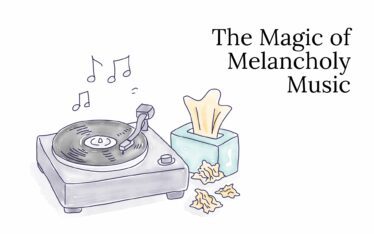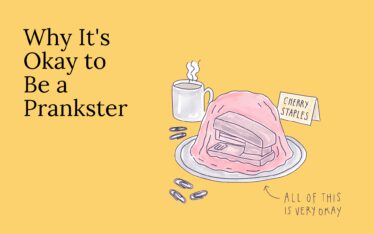I can’t bring myself to read my book reviews.
 Not even if I squint and try to scan— awkwardly with one eye—for kind words on Amazon and Goodreads reviews. I’m just too chickenhearted.
Not even if I squint and try to scan— awkwardly with one eye—for kind words on Amazon and Goodreads reviews. I’m just too chickenhearted.
You Only Die Once was published 500 days ago, which means I’ve spent the last 500 days in a row actively avoiding feedback.
Okay that’s not entirely true: I have been admirably open to positive feedback.
But the platforms don’t let you sift and sort for the glowy “this book is the best thing since sliced gluten-free bread!!” five-star reviews, which means I need to wade into the treacherous four-star territory (or oh dear god, less than four stars—please just kill me on the spot) in order to feel good about myself.
I briefly considered asking a virtual assistant to cut and paste the nice things people had to say on Amazon and send them to me in an email—conveniently overlooking the not-so-hot comments—but I thought that might make me seem unbalanced. MAYBE BECAUSE THAT WOULD BE THE PRECISE DEFINITION OF UNBALANCED.
I figure it’s my penance for being weak-willed; if I’m not brave enough to read the tough feedback then I don’t deserve to read the good stuff. (No one ever said I wasn’t deeply, darkly neurotic 😏.)
How I chastise myself for avoiding feedback… an assortment of inner voices:
- “If I was a self-actualized adult I’d be sporting a growth mindset, open to learning and growing and other kinds of bullshit.”
- “I’m the one that asked for people to review YODO.” (To be clear: I asked for the friendliest of my family and friends to review the book, not strangers.)
- “When did I become such a chickenshit?” (I’m pretty sure I know exactly when that happened: publication day.)
- “Who cares about what Ricky from Pomona thinks about YODO?” (I do. Damnit, Ricky, I do.)
When I am disturbed by myself, instead of going to therapy, I go to Google Scholar and look up research papers. Here’s the psychology on why we avoid negative feedback; see if anything looks familiar in your life when it comes to deking constructive critiques:
#1: We like to feel good about ourselves. Consistent with self-enhancement theory, we prefer feedback that bolsters the positive self-views we have about ourselves. Who doesn’t want the warm glow of an “agreeable fancy”? Do you find yourself selectively… almost exclusively… seeking out the good news, just to get that fanciful glow?
#2: We don’t like to feel bad about ourselves. The “ostrich effect” shows up in situations where we are “emotionally invested in information and have some ability to shield (ourselves) from it.” Studies show that financial investors are more prone to monitor their portfolios in rising markets, and likelier to put their heads in the sand when markets are flat or falling. (If I didn’t identify so closely with being a chicken, I’d have drawn an ostrich for this post.) Are you prone to avoiding negative information when you have the choice to do so?
So what?
Can’t we just be chickenshits and call it a day? Does this even matter?
Maybe, maybe not.
If we are avoiding crucial information (or what psychologists call blunting), then the joke might be on us. Avoiding screenings for cancer or medical issues, for example, might avoid mental discomfort in the short term, but might feel a lot like chemo in the long term 😬. Avoiding constructive feedback from the boss might feel relieving today but feel like a damning performance improvement plan tomorrow. Even if dodging health and career feedback doesn’t lead to the extremes of death and unemployment, we might miss out on the upsides of life—like the opportunity to improve our health and professional development. It’s up to us to assess when ignorance is bliss (i.e., when it’s good for our well-being to circumnavigate reality) vs. when ignorance is potentially detrimental.
I’ve decided my allergy to Amazon reviews is 79% protective of my sanity and 21% problematic for my development. Sure, I might glean constructive insights about what my readers think about my writing, and that could in turn make me a better writer and speaker. But if my tendency is to dwell over the not-so-nice comments, I’d prefer to shelter my (apparently and appallingly fragile) feelings.
(Case in point: I read an early review from a gentleman who didn’t enjoy me or my use of profanity. After telling him to go fuck himself—in my head, because I’m not trying to get murdered—I clapped my laptop shut and abstained from further review reading. I do not need that guy’s overly-sensitive-to-swearing input in my overly-sensitive-to-everything head as I write new profanity-laced articles.)
We must consider the source of the feedback.
Thea, my editor, edited my book, so by definition she gave me constructive feedback on the 105,906 words housed within 11 chapters. I took deep breaths, big swigs, and was ultimately grateful for her input.
If your boss gives you feedback, it’s likely worth heeding if you wish to grow on the job and remain employed. This is obviously a harder pill to swallow if he or she is a moron, but COBRA ain’t cheap.
If your 360º review includes feedback from your colleagues, you can be self-actualized and take it all “under advisement”… or you can systematically decipher who said what and dismiss everything from three quarters of your team, Rhonda from IT, and the rat who gave you a bunch of 3’s.
If a client gives you feedback, it’s probably worth treating like gold. If a random person says something snarky about your services/ products/ face on Instagram, it’s maybe okay to dismiss.
But what if a colleague or a rando says something that isn’t cutting? What if the feedback is undeniably neutral in tone and candidly constructive? That’s harder to ignore. That’s where I struggle.
I just peeked at a Goodreads review, for R&D purposes in writing this article (😬). Someone said YODO was “too long.” My feelings felt hurt. I felt embarrassed by the sprawling 105,906 words. And then I remembered a comment made by another reader who said YODO was too short. Why didn’t I write more than 105,906 words?!? Do these reviews cancel each other out? (Yes, Jodi, they do. It’s like they never happened at all, Sweetie.)
An author friend of mine hates negative reviews so much that she looks up the commenters online to surreptitiously scoff at their lives.
“Remember that Jeff guy who gave me one star?” she texted me.
“Um, no, but go on.”
“He has a Pomeranian! What an asshole.”
I didn’t know having a cute dog made you an asshole, but making fun of someone’s cute dog apparently helps restore some people’s egos.
Another writer I know is on the opposite end of the spectrum as me; he demands feedback. Sitting down at a recent conference, he asked me what I thought of his book. I gave him two specific, honest, positive comments. He looked crushed.
“Feedback is the breakfast of champions,” he pleaded. (I believe that waffles are the breakfast of champions.)
“I just gave you two pieces of feedback.”
“It doesn’t count if it doesn’t sting.”
He left to find someone who would kick him in the balls.
Now what?
When it doubt, flowchart it out:

Will I work on building a thicker skin, for the sake of growth? I probably won’t. It’s like how I’ve resigned myself to not being the kind of person who can do pull-ups. I could work at it but I wouldn’t like my life while working at it in the gym. I’m okay to be the kind of person who is sensitive to feedback about the vulnerable stuff I create. I will keep writing and speaking and throwing it out there—because I really do feel maniacally compelled to wake people up to live before they die—and not everyone has to like it (*insert distraught face*). I’ll just keep my head in the sand.

P.S.: Now that I’ve gone on and on about my book, You Only Die Once: How to Make It to the End with No Regrets, thanks for buying it and then giving it a glowing review that I will probably never read.
P.P.S.: Let’s connect on Instagram!
P.P.P.S.: Oh and just in case you missed it… I’d love you forever if you took 16 minutes out of your life to watch my TEDx talk!






